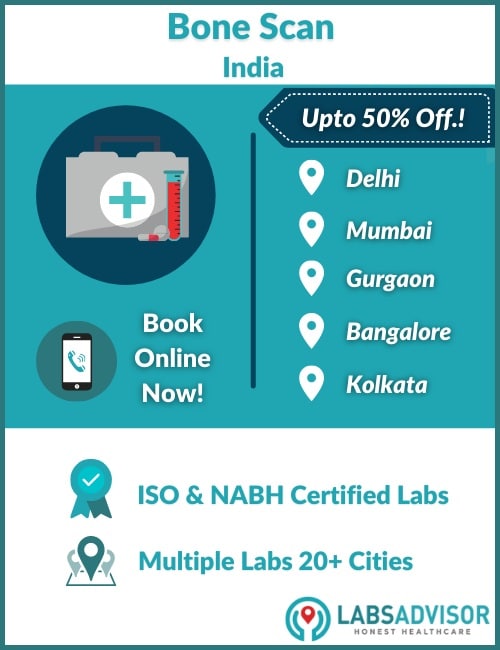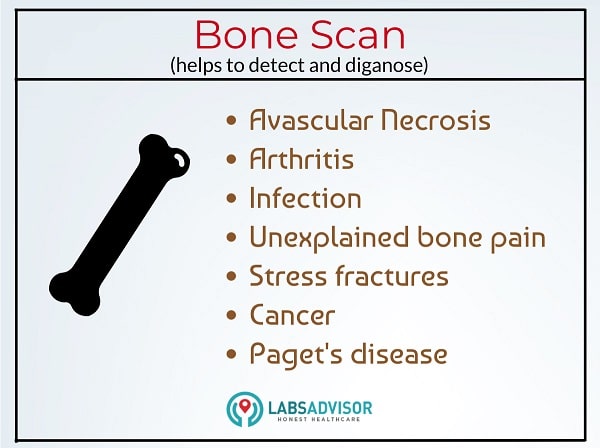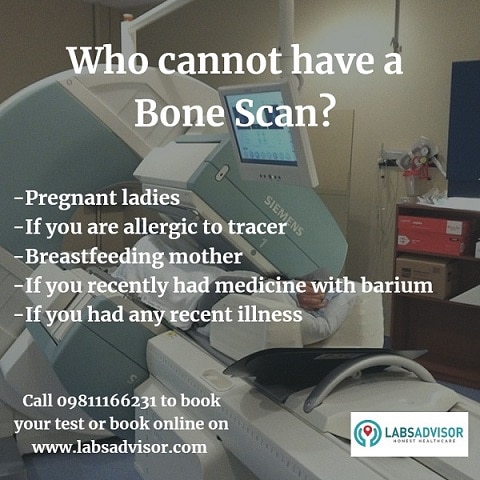
A Bone Scan is a nuclear imaging test that looks for changes or abnormalities in the bones. Nuclear bone imaging is relatively inexpensive, widely available, and fairly responsive and is invaluable in the diagnosis of numerous bone conditions. The nuclear bone scan is also known as bone Scintigraphy.
Book your bone scan near you at your local top-quality labs through us at up to 50% discount. The lowest Bone scan cost in India is ₹4200 only.
Bone Scan in India Through LabsAdvisor
|
Bone Scan Cost in India and Lab Details
Below is the list of the cities providing Bone scan costs in India, please click on the link of the city you want and you can see all the labs near you and book online.
You can also select the time slot suitable for your Bone scan. Click on the link to know the updated price.
| Bone Scan Cost in India | Prices Starting From |
| Bone Scan Price in Delhi | ₹4200 |
| Bone Scan Price in Gurgaon | ₹4200 |
| Bone Scan Price in Noida | ₹4200 |
| Bone Scan Price in Mumbai | ₹6080 |
| Bone Scan Price in Thane | ₹6080 |
| Bone Scan Price in Bangalore | ₹4812 |
| Bone Scan Price in Kolkata | ₹6300 |
| Bone Scan Price in Ahmedabad | ₹4750 |
| Bone Scan Price in Other Indian Cities | ₹4200 |
What is a Bone Scan?
A Bone Scan is a nuclear imaging test that looks for changes or abnormalities in the bones. Nuclear bone imaging is relatively inexpensive, widely available, and fairly responsive and is invaluable in the diagnosis of numerous bone conditions. The nuclear bone scan is also known as bone Scintigraphy.
Numerous studies have confirmed that bone scintigraphy is considerably more sensitive for detecting skeletal abnormalities than conventional radiography. Although the bone scan is not specific, i.e. it cannot pinpoint the disease responsible for the symptoms, it is still widely carried out due to its exquisite sensitivity.
Due to nutritional deficiencies and lack of vitamin D, bone problems are widespread in India. Osteoporosis is quite common in Indian women. Bone diseases create a barrier to the normal lifestyle and hinder in day-to-day activities. Proper nutrition is necessary for healthy bone metabolism.
Why is a bone scan done?

A Bone Scan may be prescribed to check the rate of a bone formation called bone metabolism. It may be done to find or help treat any of the following medical conditions:
- Avascular necrosis. It is a condition where parts of the bone die because of a lack of blood supply them.
- Bone diseases, such as arthritis, fibrous dysplasia, rickets, or Paget’s disease.
- To check if prostate, breast, or other cancer has spread the bones.
- Changes in the bones after radiation therapy.
- Early stress fractures that have not caused a completely broken bone.
- Infection of the bone is called osteomyelitis.
- If there is pain along the front of the bone of your lower leg called shin splints.
- If there is trauma to the bones after an accident such as hip bones.
- To detect some abnormalities related to leukemia and lymphoma.
- Spondylolysis is a common cause of pain in young adults. When the initial x-rays are negative, the nuclear bone scan serves as a specialized imaging process for diagnosis.
- Unexplained bone pain. A bone scan helps in diagnosing the cause or location of unexplained bone pain, such as ongoing lower back pain. A bone scan may be advised first to determine the location of an abnormal bone in complex bone structures such as the foot or spine.
- Patients with venous obstruction have swelling in the affected area. By three-phase bane scan collateral vessels are identified for further treatment.
How is it done?
You will have to make a prior appointment with the radiology department for the scan.
At the laboratory, a health assistant will check your weight and then put an IV line into the vein of your hand or your arm. A solution containing a radioactive tracer will be injected through the IV. This radioactive tracer breaks down after some time and radiates gamma rays. The gamma rays scanner will scan for the amount of tracer in your bones.
The interval between the injection and scan will depend upon the disease to be diagnosed. If a bone scan is done to diagnose bone infection, the scan may be carried out shortly after the radioactive material is injected again 3 to 4 hours later, when it has accumulated in the bones. To evaluate metastatic bone disease, the scan is done after 3-4 hours. Drink plenty of liquids, such as water or juice between the time of the injection and the scan procedure. Make sure you go to empty your bladder as much as possible to avoid tracer collecting in your bladder.
Before going for the scan, remove jewelry or any other metal objects on you. Change into the hospital gown and empty your bladder. You will be taken to the scan room and asked to lie on a table. The radiologist will use the gamma scan machine to take images of your bone. You must lie very still and move only when asked by your radiologist. The procedure will take about 45-60 minutes.
What are the risks involved?
The amount of radioactive tracer injected into your vein is very small. All of it is gone from the body in 24 hours. The radiotracer that is used exposes you to a very small amount of radiation. The risk is probably not greater than those with conventional x-rays.
- The procedure is totally painless.
- There is a slight risk of infection or bleeding when the needle is inserted into your vein.
- If you are pregnant then you should avoid the scan, as radiation may be harmful to the baby.
Who cannot have a bone scan?

- Pregnant lady
- If you are breastfeeding, and you must have the test then you should pump the breast milk and throw that away for at least two days.
- Tracer allergy is very rare but speak to the doctor if you think you are allergic to it.
- If you recently had medicine with barium (Barium Enema). Wait for four days as barium may interact with the procedure and give false results.
What do the results show?
- The test results are considered normal if the tracer is present evenly throughout the bone. The image will look the same color (gray) throughout.
- An abnormal scan will have either “hot” or “cold” spots. Hotspot means the area appears darker than normal and has more accumulation of the tracer. The spots are the areas that appear lighter or white due to the lack of presence of the tracer.
- Hot spots may indicate a bone infection, cancer, arthritis, or a fracture that is healing. It may also indicate abnormal bone metabolism such as Paget’s disease.
- Cold spots may point to a lack of blood supply to the bone called bone infarction. It may also indicate a certain type of cancer such as multiple myeloma.
- You must remove the jewelry and other metal objects from your body. You may be asked to wear a hospital gown.
- Inform your doctor if you are or may be pregnant.
- DO NOT take any medicine with bismuth in it, such as Pepto-Bismol in 4 days before the test.
Other topics you may be interested in:-
- Dexa Scan / Bone Density Test Cost in Bangalore
- Bone Density Test / Dexa Scan Cost in Delhi
- Mammography Test Cost in India
- CT Angiography Scan Cost in Delhi
- PET Scan Cost in India







If your Bone scan is not listed in the table above, call us on +918061970525. We will get back to you with the Bone scan cost near your location in India.
Get the lowest Bone scan cost in India by calling us at
☏+918061970525
If you want us to call you back, click on the link below